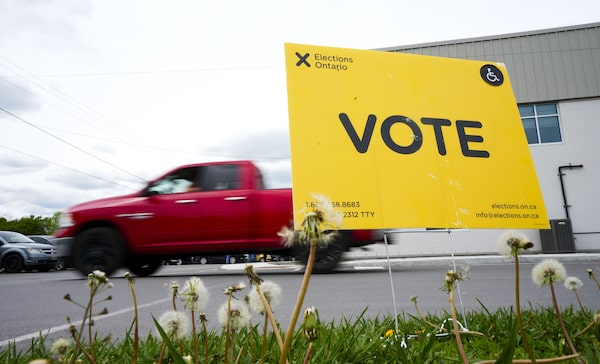
A vote sign is displayed outside a polling station during advanced voting in the Ontario provincial election in Carleton Place, Ont., on Tuesday, May 24, 2022.Sean Kilpatrick/The Canadian Press
It’s day 23 of the Ontario election and election day is one week away. Today, the party leaders are on the campaign trail focusing on key issues, including long-term care, in key ridings.
Three of four of Ontario’s major political parties are pledging to remove for-profit care from the system. The long-term care system is a stated priority for all parties, but only the Progressive Conservatives have rejected calls to phase out for-profit operators.
Government figures show that the number of seniors in the province is expected to nearly double, from about 2.6 million in 2020 to almost 4.5 million by 2046. The 75 and over population is projected to more than double, from 1.1 million in 2020 to almost 2.7 million by 2046. The NDP, Liberals and Greens have all discussed their campaign pledges to end for-profit long-term care in Ontario.
Here’s where the leaders of Ontario’s main political parties are today:
Progressive Conservative Leader Doug Ford
Doug Ford did not take questions from the media Thursday. His only scheduled event being a rally in NDP Leader Andrea Horwath’s home turf of Hamilton – a city’s that’s home to a large labour and manufacturing base. The PCs have been courting endorsements from skilled trades unions.
Polling: Doug Ford is the top choice in the Ontario election on pocketbook issues, according to a new poll that also shows a large majority of respondents are uncomfortable with building homes on farmland and green space as a way to bring down housing costs. The poll, by Nanos Research for The Globe and Mail, was conducted amid the Ontario provincial election in which housing affordability, pandemic recovery and infrastructure have become key issues.
NDP Leader Andrea Horwath
Andrea Horwath was in Brampton, where the NDP hope to build on the three seats won in 2018. She talked about the party’s plan to end hallway medicine. Horwath’s itinerary includes stops in Kitchener and Fergus.
Andrea Horwath wants to ‘fix what’s broken’ in Ontario. Is that enough to win the NDP more seats?
Long-term care: The NDP have pledged 50,000 new long-term care beds, which should be managed by the not-for-profit and municipal sectors, by 2030. At a campaign stop in Brampton, Horwath said long-term care was in crisis long before the pandemic, laying blame at the feet of both Liberal and Progressive Conservative governments.
“We tried to get them for many years to invest in long-term care and to really turn around the horrific circumstances that people were living in, in long-term care homes, particularly the ones that were operated by private companies, but long-term care really did take the brunt,” Horwath said.
“More privatization in our health-care system is the wrong way to go. People should not be, corporations should not be, shareholders should not be reaping profits on the backs of our loved ones.”
The NDP say they would stop issuing new for-profit licences, stop renewing for-profit contracts and transfer delivery of those services to community health organizations and not-for-profit operators. Some of the funds from the PC’s planned $158.8 billion spend on infrastructure would be reallocated to achieve that. They would put $750 million a year over eight years towards providing direct financial support to municipalities, not-for-profits and other community organizations to help them take over the operation and ownership of for-profit homes.
Liberal Leader Steven Del Duca
Steven Del Duca made an announcement in Richmond Hill on ending for-profit elder care. He will also make stops in Markham, Ajax and Toronto where he will make an announcement on making the rich pay their fair share.
Steven Del Duca a hopes personal approach to politics will return Liberals to power in Ontario
Long-term care: The Liberals have promised 30,000 new long-term care beds, which should be managed by the not-for-profit and municipal sectors, by 2028. “Collectively as Ontarians, we need to learn the lessons of what we saw take place during COVID, particularly for our seniors,” Del Duca said during a campaign stop in Richmond Hill.
The Liberals have laid out in their costing that they would budget $600 million over the next four years to finance the transfer of existing homes to not-for-profit entities and municipalities. They would aim to end for-profit care by 2028.
Del Duca said the Liberals would provide loan guarantees or have the province actually purchase the homes and own them as assets for a time before they are transitioned to the not-for-profit sector.
“(Ford) legitimately seems to believe that putting shareholders and dividends ahead of care and ahead of our seniors is the best way to solve this problem.”
Green Party Leader Mike Schreiner
Mike Schreiner is in Guelph for the day, participating in a local All Candidates Debate and canvassing in the community.
Long-term care: The Greens have promised to build 55,000 new long-term care beds, which should be managed by the not-for-profit and municipal sectors, by 2033. They would increase base funding for long-term care by 10 per cent to begin the shift to non-profit elder care.
Early voting for the Ontario election
Advance polls for early voting: Advance polling is now open until May 28. Ontarians can vote at any of the advance voting locations in their electoral district. Advance voting locations are open from 10 a.m. to 8 p.m. ET. Find your electoral district by entering your postal code on the Elections Ontario website. Election day is on June 2.
Ontarians can register to vote online through Elections Ontario’s eRegistration. Voters will need one piece of identification that has their name and current residential address in order to register.
Want to hear more about the Ontario election from our journalists? Subscribe to Vote of Confidence, a twice-weekly newsletter dedicated to the key issues in this campaign, landing in your inbox starting May 17 until election day on June 2.